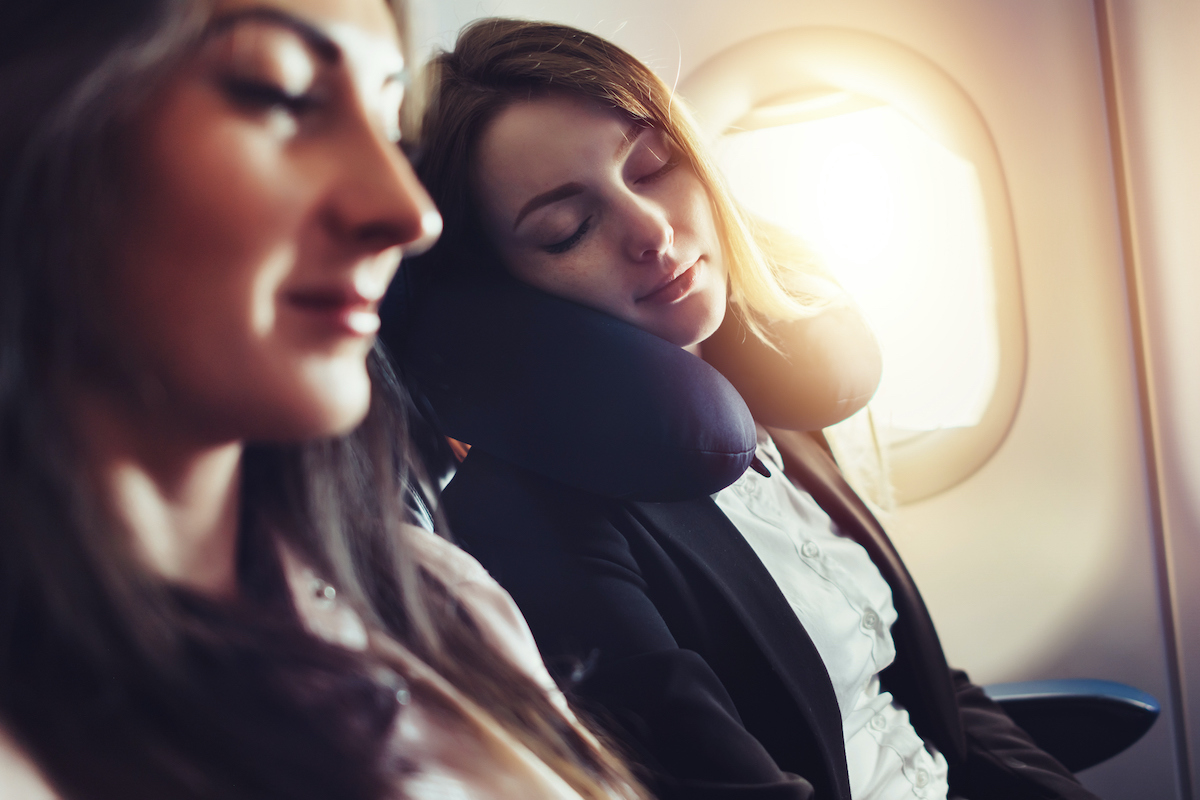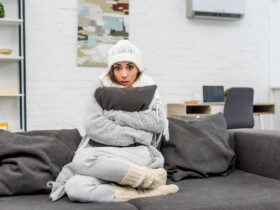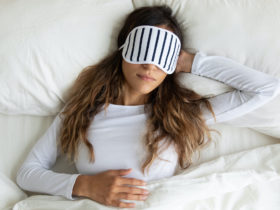Why is sleeping so hard when you are traveling? It’s not just your imagination. Your brain is actually making it harder to sleep well away from home — a phenomenon scientists call the “first-night effect.”
When you go to sleep for the first time in new surroundings, half of your brain stays awake to serve as night watch in case anything goes wrong.
That half of the brain is super vigilant, so it hears every little noise and bump in the night. This vigilance can make it tough to fall asleep, stay asleep, and get the kind of restorative sleep you need for optimum health.
Researchers think the “first-night effect” is a survival technique your brain uses to keep you safe in unfamiliar and potentially dangerous surroundings. (Like that super dangerous king size bed in your luxury hotel suite. Thank you, brain.)
While I’m sure we all appreciate the well-meaning safety measures, the “first-night effect” can leave you feeling exhausted the next morning.
Grogginess can interfere with your performance on a business trip and ruin your fun on holiday; fatigue can also ratchet up the stress of being away from home.
Staying in a new place each night of your trip compounds the effects, as it gets harder to fall asleep when you’re sleep-deprived.
Other travel-related factors, aside from the unfamiliar surroundings of a hotel or Airbnb, can also interfere with quality sleep on the road. Sleeping in the cramped space of an airline seat can tie your body in knots, for example, and jet lag from traveling across time zones can leave you wondering if it’s day or night.
Traveling can also interfere with your circadian rhythm, which is your body’s natural clock that tells you when to go to sleep and when to wake up.
Fortunately, you can take steps to reduce the “first night effect” and other travel-related sleep-busters to improve both the quality and the quantity of sleep when you’re away from home.
Sleep Strategically Before — and During — Your Trip
If possible, sleep strategically prior to your trip. In other words, catch up before you get behind.
About three days before you leave, start moving your bedtime an hour earlier or later than normal so that it more closely matches your bedtime while traveling.
Sync up with the local schedule when on long trips.
If you arrive at your destination during the day when the locals are awake, you want to be awake, too. If you arrive at night, try to stay awake on the plane so that you can sleep for the rest of the night at your accommodations.
This rule does not necessarily apply if you are staying fewer than two days; short trips typically don’t provide enough time for your body to adapt. In these cases, stick to the same sleep schedule you use at home. Whenever possible, schedule your travel activities so business meetings or other important events happen during the equivalent of your peak waking hours at home.
Keep Cool
As you fall asleep, your body temperature drops slightly to initiate sleep. Decreasing the temperature of the room mimics this response and facilitates sleep. The National Sleep Foundation suggests keeping your bedroom between 60 and 67 degrees Fahrenheit at night.
Sleeping at higher or lower temperatures could negatively affect the quality of your sleep.
Try taking a hot bath or shower about an hour before bed. The hot water will elevate your body temperature. As your body cools down, it will signal to your brain that it’s time to get some sleep. The cool-down time is important — you won’t get the same results if you hop right out of the shower and into the sheets.
Aim for Dark and Quiet
A dark, quiet sleeping space gives your brain a break from its night watch duties. Use a white noise machine while traveling only if you use one at home.
Embrace Warmth and Light During the Day
As cool temperatures trigger sleep, warm temperatures can awaken you. Go for a brisk walk, hit the shower or turn up the thermostat when you first wake up.
Exposure to light during the day can help reset your circadian rhythm so that you can sleep better at night. Be sure to get some exposure to sunlight in the late morning and early afternoon, even on cloudy days.
Limit Caffeine
Caffeine blocks your adenosine receptor, which keeps you from feeling sleepy. That’s well and good first thing in the morning, but consuming caffeine too late in the day can really wreak havoc on your sleep.
Consuming caffeine up to six hours before your bedtime can interrupt your sleep by an hour (or more, for older adults).
If you need a morning cup of coffee to greet the day, that’s fine. But limit your caffeine intake and keep it just the morning hours if you don’t want to disrupt your evening sleep.
And Limit Alcohol
For some people, traveling and drinking go together like, well, gin and tonic. But too much booze could have a negative impact on your sleep.
Sure, alcohol may make you feel drowsy and even help you fall asleep faster.
But alcohol can contribute to poor sleep quality — a trade-off that may not be worth it in the long run.
A good night’s sleep can make all the difference between a good trip and a bad one. Practicing some of these tips can improve the quality of your sleep and ensure happy travels every time you leave home.











Join the GloWell Community on Social!
Don't risk missing a single thing. Follow us on social and become part of the GloWell community.